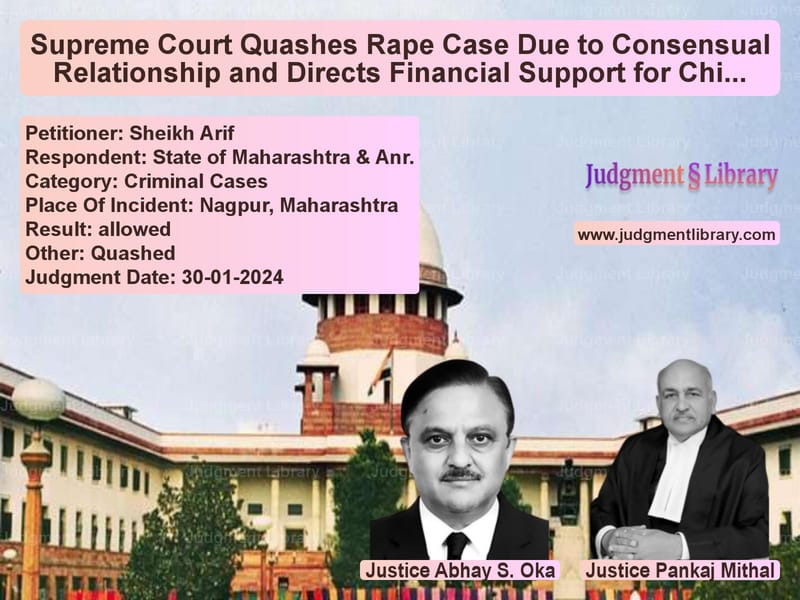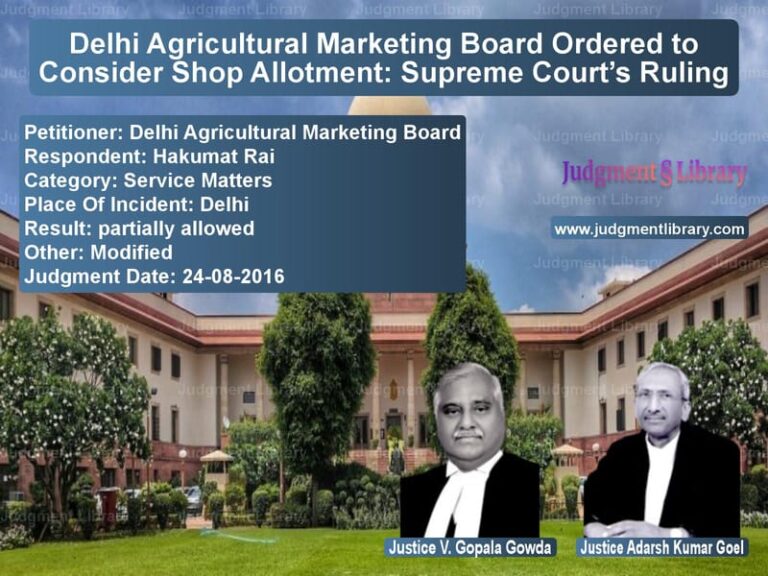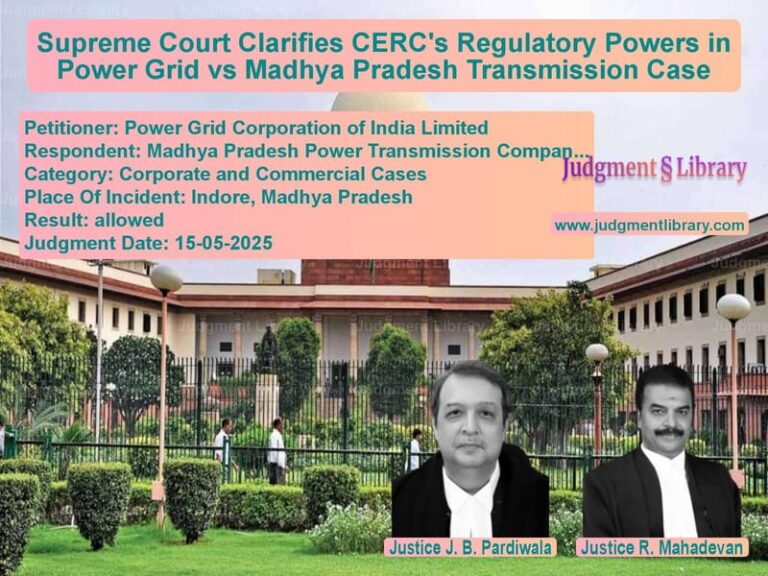Supreme Court Quashes Rape Case Due to Consensual Relationship and Directs Financial Support for Child
The Supreme Court of India has ruled in favor of the appellant, Sheikh Arif, by quashing a rape case filed against him on the grounds that the relationship between him and the complainant was consensual. The judgment in Sheikh Arif vs. State of Maharashtra & Anr. highlights the distinction between consensual relationships and false promises of marriage under Section 375 of the Indian Penal Code (IPC). The Court also directed the appellant to provide financial support for the child born out of the relationship, ensuring that the child’s rights are protected despite the legal proceedings.
Background of the Case
The case originated from a complaint filed by the second respondent, a woman who alleged that the appellant had engaged in a physical relationship with her under the false promise of marriage. The complainant stated that she had been in a relationship with the appellant since 2011 and that he had repeatedly assured her of marriage. However, she later discovered that the appellant had married another woman in February 2018, prompting her to file an FIR under Sections 376(2), 377, 504, 506 IPC and provisions of the Scheduled Castes and Scheduled Tribes (Prevention of Atrocities) Act, 1989.
Chronology of Events:
- 2011: The appellant and the complainant became acquainted.
- 2012: The complainant alleged that the appellant had sexual intercourse with her based on a false promise of marriage.
- 2013: She became pregnant, and the appellant arranged for an abortion.
- 2017: The complainant and appellant were engaged, and their relationship continued.
- 2018: The complainant discovered that the appellant had married another woman.
- 2018 (February 23): An FIR was filed against the appellant.
- 2021: The appellant approached the High Court seeking quashing of the FIR.
- 2024: The Supreme Court quashed the criminal proceedings, ruling that the relationship was consensual.
Legal Issues Before the Supreme Court
- Whether the physical relationship between the parties was based on a false promise of marriage.
- Whether the complainant’s consent was vitiated by fraud.
- Whether the appellant’s prosecution was an abuse of legal process.
- Whether financial compensation should be provided for the child born out of the relationship.
Arguments by the Petitioner (Sheikh Arif)
The appellant, through his legal counsel, argued:
- The relationship between him and the complainant was consensual and spanned several years.
- They were engaged in 2017, and there was no evidence that the appellant had promised marriage from the inception of the relationship.
- The complainant voluntarily maintained the relationship even after knowing about his engagement.
- False promise of marriage must be established from the start of the relationship, not years after it began.
- The complaint was filed in 2018 only after the appellant’s marriage, suggesting that it was retaliatory.
Arguments by the Respondent (State of Maharashtra & Complainant)
The complainant and the prosecution countered:
- The appellant had consistently assured the complainant that he would marry her, which led her to consent to a physical relationship.
- The complainant became pregnant twice, and on both occasions, the appellant manipulated her into undergoing an abortion.
- The engagement was a ploy by the appellant to continue deceiving her.
- Since she was a member of the Scheduled Caste community, the appellant’s actions violated the provisions of the SC/ST Act.
Supreme Court’s Observations
The Supreme Court carefully analyzed the evidence, including the nature of the relationship and legal precedents on false promises of marriage. The key observations included:
“In view of the provisions of Section 375 IPC, if the victim of the alleged offense of rape is not under 18 years of age, maintaining a sexual relationship with her consent is not an offense.”
“If it is established that from the inception, the consent by the victim is a result of a false promise to marry, there will be no consent, and in such a case, the offense of rape will be made out.”
“The complainant and the appellant were in a long-standing relationship, and she was aware of the circumstances. There is no evidence that the appellant had fraudulent intent from the beginning.”
Final Judgment
The Supreme Court ruled:
- The FIR and criminal proceedings against the appellant were quashed.
- The appellant was directed to deposit ₹5 lakh as financial support for the complainant’s child.
- The ₹10 lakh already deposited by the appellant with the High Court would be invested in a fixed deposit for the child’s benefit until adulthood.
- The complainant retains the right to file for maintenance and other legal remedies.
Implications of the Judgment
This ruling has major implications for cases related to relationships and false promises of marriage:
- Clarification on False Promise of Marriage: Courts must determine whether deception was present from the inception of the relationship.
- Protection from Misuse of Legal Provisions: The judgment prevents the criminalization of consensual relationships unless clear fraudulent intent is proven.
- Financial Responsibility for Children: The Court ensured that despite quashing the criminal case, the child’s welfare was protected.
- Balancing Rights: The decision upholds both the rights of individuals in consensual relationships and the need for financial support in cases where children are involved.
Conclusion
The Supreme Court’s ruling in Sheikh Arif vs. State of Maharashtra & Anr. serves as a significant precedent for cases involving long-term relationships and allegations of false promises of marriage. By quashing the FIR while ensuring financial support for the child, the judgment strikes a balance between protecting individuals from wrongful prosecution and upholding social responsibilities.
Petitioner Name: Sheikh Arif.Respondent Name: State of Maharashtra & Anr..Judgment By: Justice Abhay S. Oka, Justice Pankaj Mithal.Place Of Incident: Nagpur, Maharashtra.Judgment Date: 30-01-2024.
Don’t miss out on the full details! Download the complete judgment in PDF format below and gain valuable insights instantly!
Download Judgment: sheikh-arif-vs-state-of-maharashtra-supreme-court-of-india-judgment-dated-30-01-2024.pdf
Directly Download Judgment: Directly download this Judgment
See all petitions in Bail and Anticipatory Bail
See all petitions in Fraud and Forgery
See all petitions in SC/ST Act Case
See all petitions in Judgment by Abhay S. Oka
See all petitions in Judgment by Pankaj Mithal
See all petitions in allowed
See all petitions in Quashed
See all petitions in supreme court of India judgments January 2024
See all petitions in 2024 judgments
See all posts in Criminal Cases Category
See all allowed petitions in Criminal Cases Category
See all Dismissed petitions in Criminal Cases Category
See all partially allowed petitions in Criminal Cases Category






